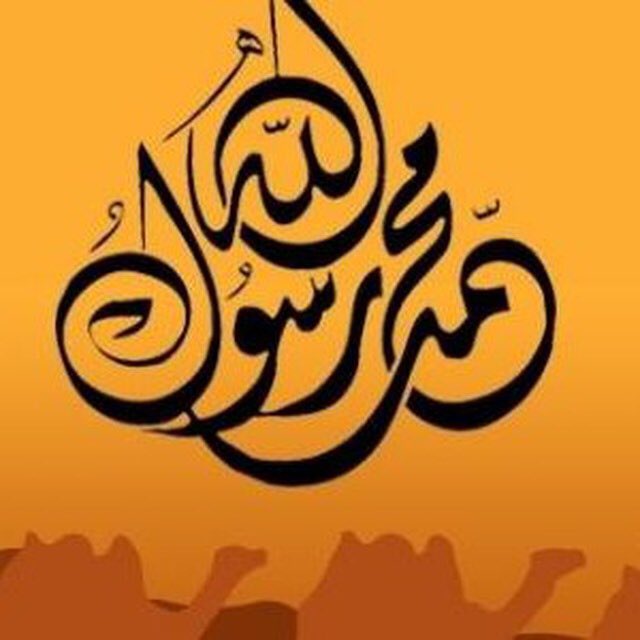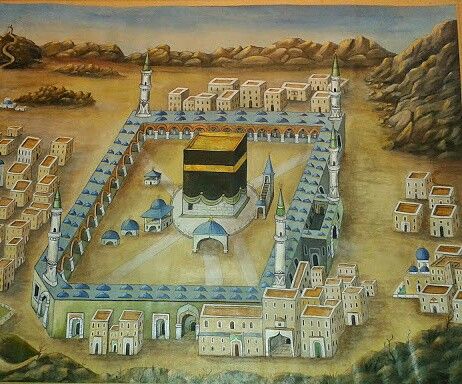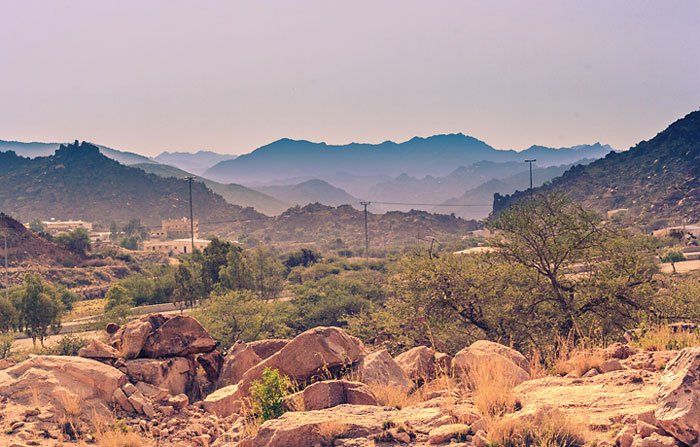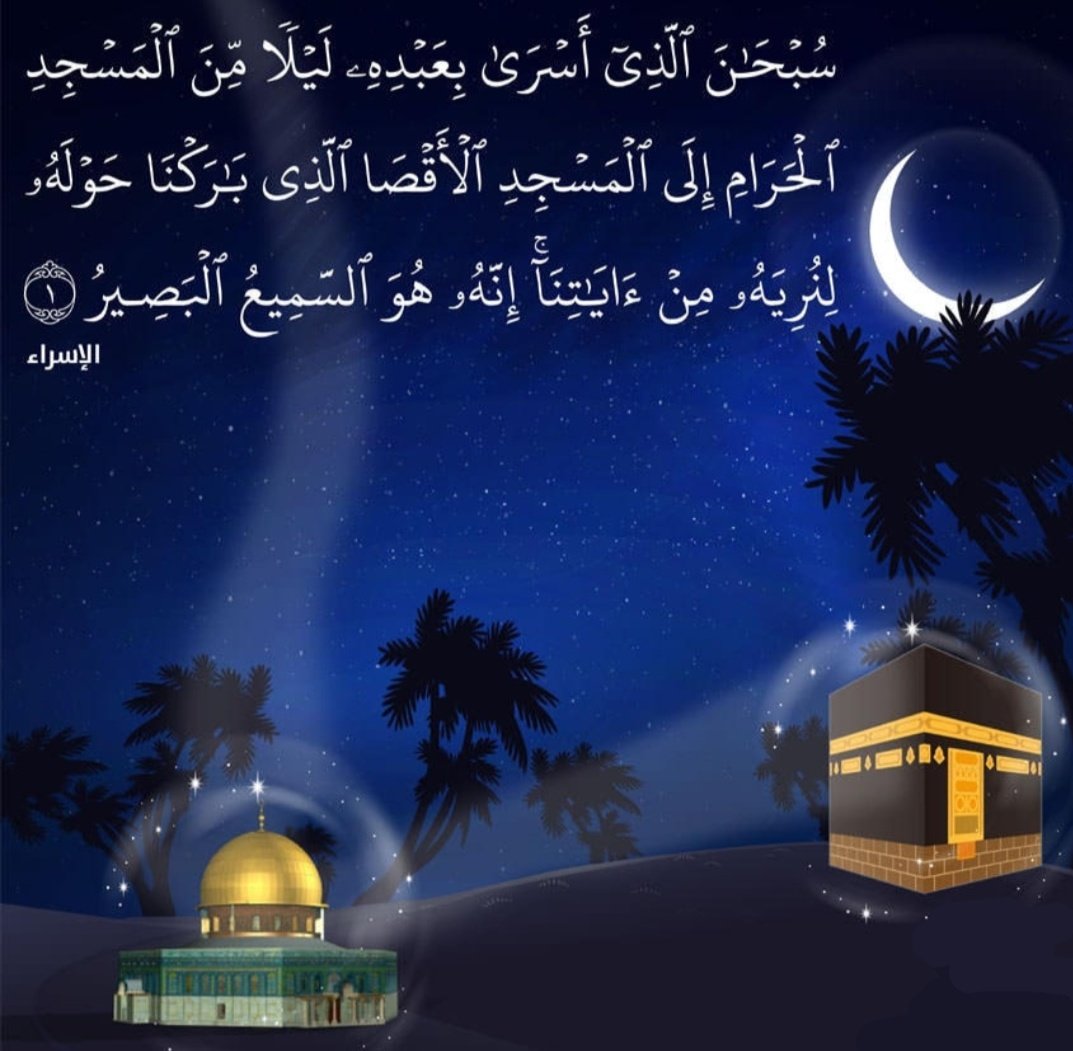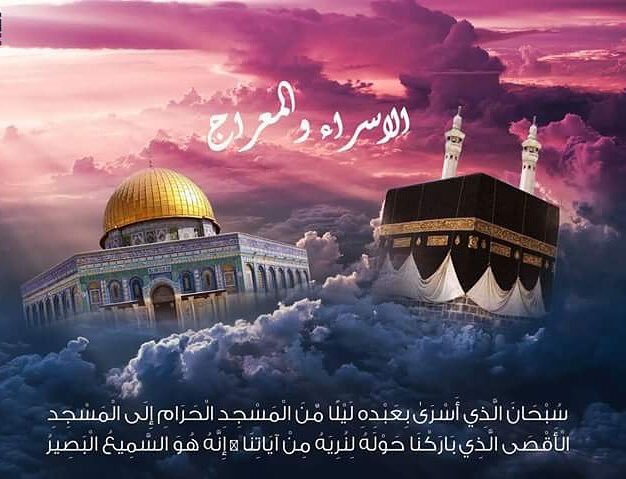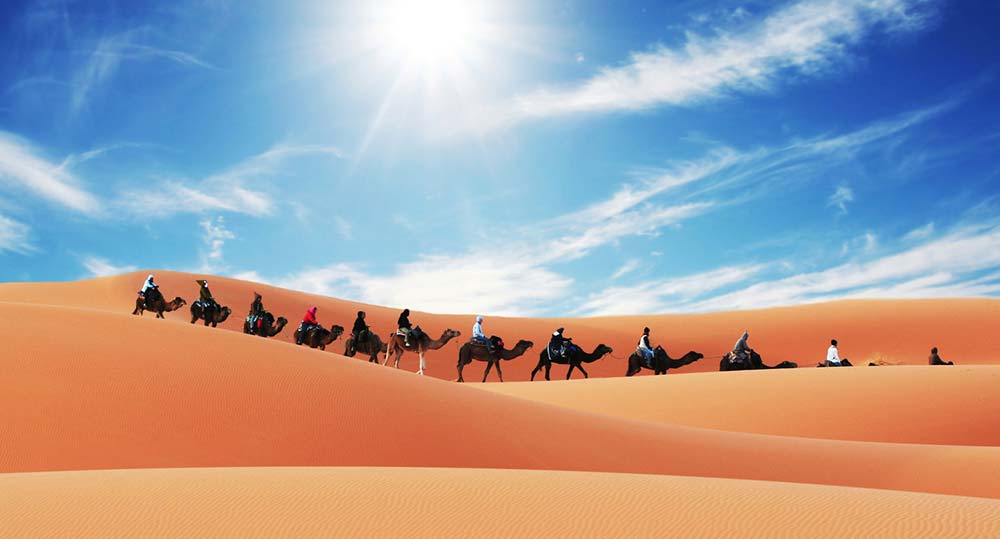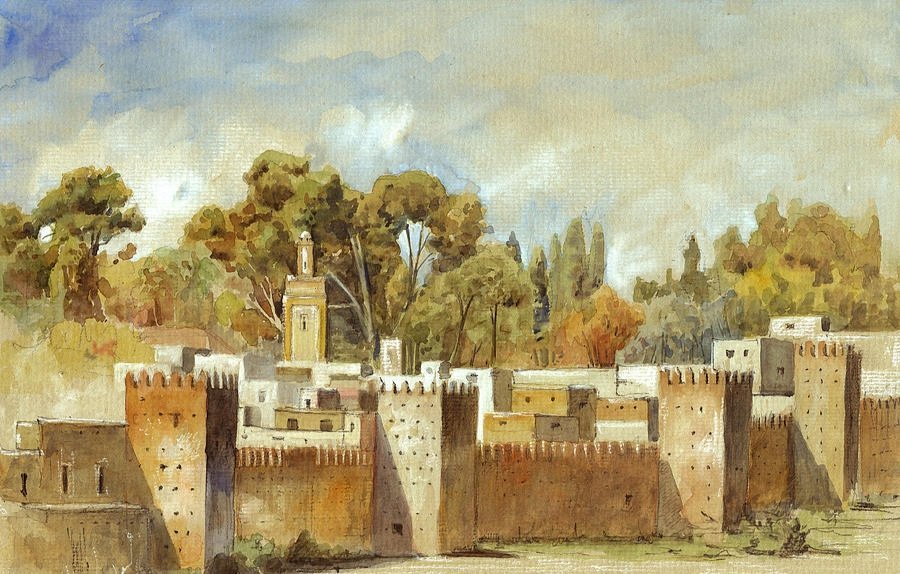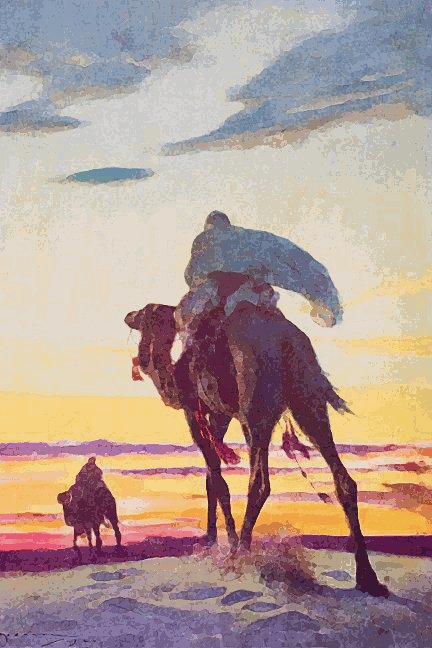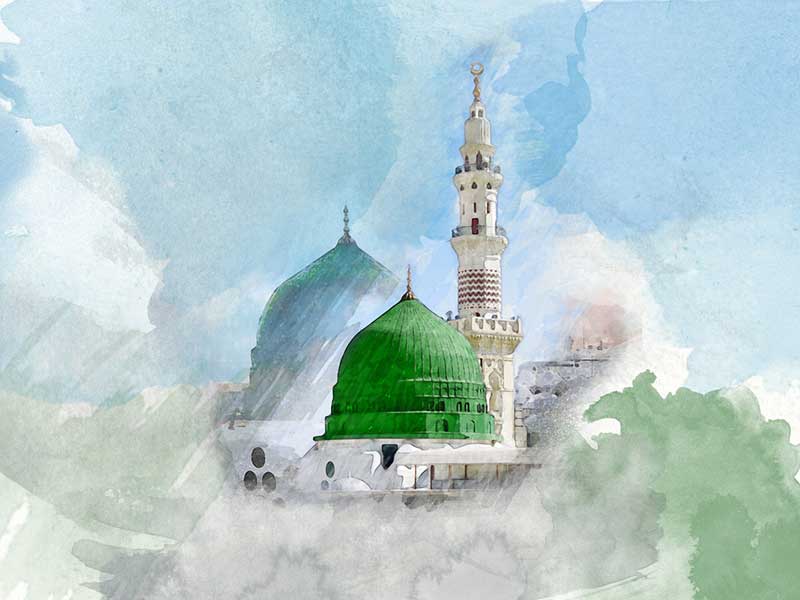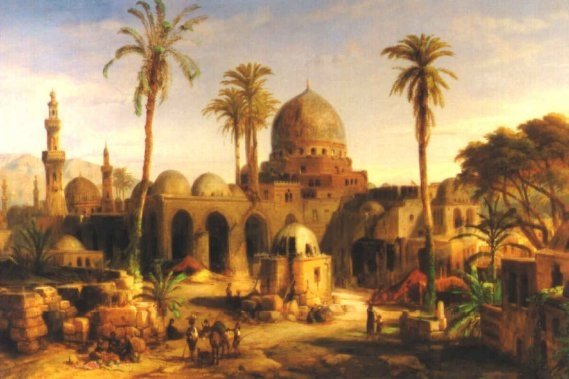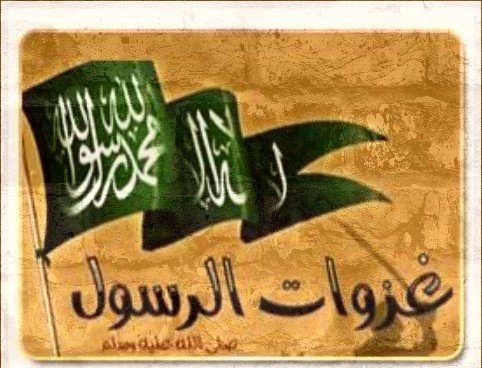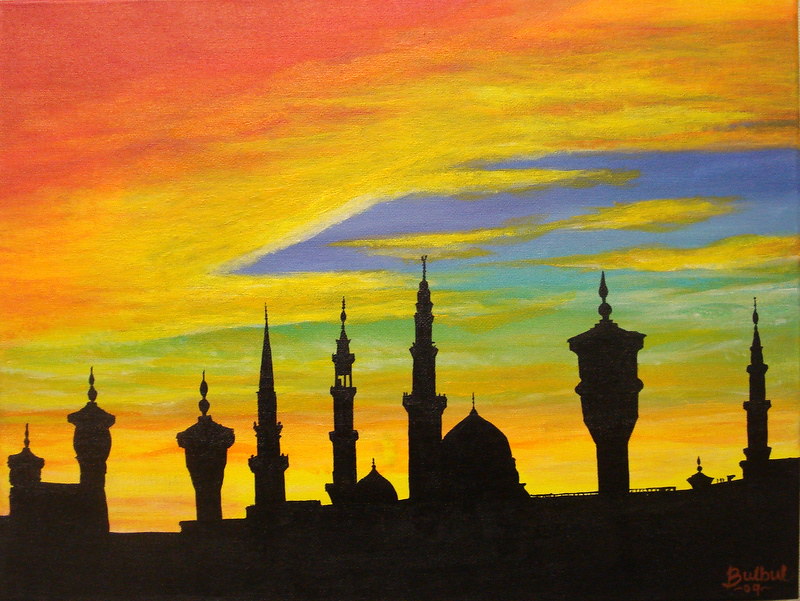This thread is on the #Seerah of Messenger of Allah ﷺ.
To join the channel: https://t.me/TheFinalMessenger">https://t.me/TheFinalM...
To join the channel: https://t.me/TheFinalMessenger">https://t.me/TheFinalM...
The Life of Prophet Muhammad ﷺ from beginning till the end:
§ Abdullah Bin Abdul-Muttalib married Aminah Bint Wahb and she bore him a son.
§ Abdullah passed away while Aminah was 2 months pregnant.
§ Abdullah Bin Abdul-Muttalib married Aminah Bint Wahb and she bore him a son.
§ Abdullah passed away while Aminah was 2 months pregnant.
§ Abdullah left behind an inheritance for his unborn child: 5 camels, some sheep, and an Ethiopian woman servant whose name was Barakah, also known as Umm Ayman.
§ On the 12th of Rabi& #39; Al-Awwal (Monday) of the Year of the Elephant, Aminah Bint Wahb gave birth to her son - Muhammad ﷺ.
§ It has not been verified in the records of history that Aminah had a special vision when she gave birth to the Messenger of Allah ﷺ.
§ It has not been verified in the records of history that Aminah had a special vision when she gave birth to the Messenger of Allah ﷺ.
§ On the seventh day, his grandfather Abdul-Muttalib circumcised him and named him Muhammad ﷺ.
§ Aminah breast-fed Muhammad ﷺ for three days but was not producing enough milk. So Thuwaibah, the slave girl of Abu Lahab breast fed him with the same milk she breast-fed her own son Masrooh.
§ Thuwaibah breast-fed Hamza Bin Abdul-Muttalib and Abi Salmah Bin Abd Al-Asad before Muhammad ﷺ.
§ Halimah al-Sa& #39;diyyah breast-fed the Prophet ﷺ along with her children:
Abdullah
Aneesah
Al-Shayma
§ Halimah al-Sa& #39;diyyah breast-fed the Prophet ﷺ along with her children:
Abdullah
Aneesah
Al-Shayma
§ The Prophet ﷺ had 7 foster brothers:
Hamza
Abu Salamah
Abu Sufyan
Masrooh
Abdullah
Al-Shayma
Aneesah
§ The Prophet ﷺ not have any siblings related to him from his parents.
Hamza
Abu Salamah
Abu Sufyan
Masrooh
Abdullah
Al-Shayma
Aneesah
§ The Prophet ﷺ not have any siblings related to him from his parents.
§ The Prophet ﷺ& #39;s chest was split open while he was staying with Halimah al-Sa& #39; diyyah.
§ Angel Jibreel removed his heart and washed it in a basin of zamzam water thus clearing away a black spot from within his heart.
§ Angel Jibreel removed his heart and washed it in a basin of zamzam water thus clearing away a black spot from within his heart.
§ Then Jibreel implanted the seal of prophethood between his shoulder blades and thus the Prophet ﷺ was protected from sinning both in speech and action. Shaytan also lost all power over him after that.
§ This seal was placed on a portion of extra flesh on the back of the prophet and is no bigger than the size of a pigeon& #39;s egg.
§ The Prophet ﷺ returned to his mother after staying for two years with Halimah.
§ His mother passed away while he was only 6 years old.
§ The Prophet ﷺ returned to his mother after staying for two years with Halimah.
§ His mother passed away while he was only 6 years old.
§ Abdul Muttalib became the prophet& #39;s guardian after the death of his mother. Abdul Muttalib passed away when the Prophet ﷺ was 8 years old.
§ The Prophet ﷺ& #39;s Abu Talib became his guardian after the death of his grandfather Abdul Muttalib.
§ The Prophet ﷺ& #39;s Abu Talib became his guardian after the death of his grandfather Abdul Muttalib.
§ The Prophet ﷺ became a shepherd over a flock of sheep and witnessed the battle of al-Fujjaar (criminals).
§ The Prophet ﷺ witnessed the Pact of al-Fudul.
§ The Prophet ﷺ used to trade on behalf of Khadijah with her servant boy Maisarah.
§ The Prophet ﷺ witnessed the Pact of al-Fudul.
§ The Prophet ﷺ used to trade on behalf of Khadijah with her servant boy Maisarah.
§ He ended up marrying Khadijah Bint Khuwailid رضي الله عنها.
§ The Prophet ﷺ was 25 while Khadijah رضي الله عنها was 40 and from her he had the following children:
Al-Qasim
Zainab
Ruqayyah
Umm Kulthum
Fatimah
Abdullah
§ The Prophet ﷺ was 25 while Khadijah رضي الله عنها was 40 and from her he had the following children:
Al-Qasim
Zainab
Ruqayyah
Umm Kulthum
Fatimah
Abdullah
§ The Prophet ﷺ witnessed the building of the al-Ka& #39;bah by Quraysh when he was 35.
§ His tribe Quraysh agreed to let Prophet Muhammad ﷺ place the black stone where he wished.
§ Allah protected the Prophet ﷺ from the evils of jahailiyyah (period of ignorance).
§ His tribe Quraysh agreed to let Prophet Muhammad ﷺ place the black stone where he wished.
§ Allah protected the Prophet ﷺ from the evils of jahailiyyah (period of ignorance).
§ He did not prostrate to any idol nor did he ever drink any intoxicants or even come close to fahishah (adultery).
§ The Prophet ﷺ was known for his honesty and trustworthiness.
§ He was given the titles الصادق الأمين.
§ The Prophet ﷺ was known for his honesty and trustworthiness.
§ He was given the titles الصادق الأمين.
§ He was also keen on keeping his blood ties and exercise the best of character.
§ When the Prophet ﷺ turned 40, signs of Prophethood became apparent. Some of them:
His dreams always came true
Solitude
Trees & stones would give salam to him
Ability to see the light of angels
§ When the Prophet ﷺ turned 40, signs of Prophethood became apparent. Some of them:
His dreams always came true
Solitude
Trees & stones would give salam to him
Ability to see the light of angels
§ At the same age, the Prophet ﷺ received his first revelation of "Read!" while he was in the cave of Hira.
§ The revelation was paused for a while after which Surah al-mudathir was revealed.
§ The revelation was paused for a while after which Surah al-mudathir was revealed.
§ The phases of dawah in the Prophet Muhammad& #39;s ﷺ life are divided into 2 periods:
¬¬Makkan period
¬¬Madinan period
§ The makkan period is divided into two phases:
¬¬Secret da& #39;wah
¬¬Public da& #39;wah
¬¬Makkan period
¬¬Madinan period
§ The makkan period is divided into two phases:
¬¬Secret da& #39;wah
¬¬Public da& #39;wah
§ The Prophet ﷺ began da& #39;wah with his close relatives and so his wife Khadijah رضي الله عنها, daughters, Ali and Zaid bin Harithah رضي الله عنهما became Muslims.
§ Then the Prophet ﷺ began to call friends with, thus Abu Bakr Al-Sideeq رضي الله عنه became Muslim.
§ The people around Makkah began to hear about the dawah of the Prophet ﷺ
§ The people around Makkah began to hear about the dawah of the Prophet ﷺ
§ The poor and needy rushed to accept Islam. The secret dawah phase lasted for 3 years and several of the first prominent people to accept Islam were from this phase.
After that, Allah revealed the verse:
فَاصْدَعْ بِمَا تُؤْمَرُ وَأَعْرِضْ عَنِ الْمُشْرِكِينَ
“And be firm in what you were commanded to do and turn away from the disbelievers.”
فَاصْدَعْ بِمَا تُؤْمَرُ وَأَعْرِضْ عَنِ الْمُشْرِكِينَ
“And be firm in what you were commanded to do and turn away from the disbelievers.”
§ The Prophet ﷺ climbed at the top of the Mount of as-Safa and publicly announced that he was the Messenger of Allah.
§ The initial response of Quraysh was to send a delegation to his uncle Abu Talib to ask him to stop the Prophet ﷺ from his da& #39;wah.
§ Quraysh did not get any positive results with Abu Talib so they sent Waleed Ibn Al-Mugheerah to try to negotiate with the Prophet ﷺ.
§ Quraysh did not get any positive results with Abu Talib so they sent Waleed Ibn Al-Mugheerah to try to negotiate with the Prophet ﷺ.
§ Quraysh did not get any positive results with Abu Talib so they sent Waleed Ibn Al-Mugheerah to try to negotiate with the Prophet ﷺ.
§ Waleed spoke to the Prophet ﷺ and the Prophet ﷺ recited to him portions of the Quran and Waleed was amazed with the eloquence and speech of the Quran.
§ Waleed returned to Quraysh and advised them to follow the Prophet ﷺ or to let him be. They rejected his view so Waleed branded the Prophet ﷺ as a sorcerer.
§ Allah sent down verses about Waleed in Surah Al-Mudatthir, giving him the news of his abode in hell-fire.
Allah says:
ذَرْنِي وَمَنْ خَلَقْتُ وَحِيدًا
“Leave me alone with the one whom I created alone.”
Allah says:
ذَرْنِي وَمَنْ خَلَقْتُ وَحِيدًا
“Leave me alone with the one whom I created alone.”
§ Abdullah bin Umm Maktoom (the blind sahabi) became Muslim in this period and became the next Mu’adhin of Islam after Bilal bin Rabah رضي الله عنه.
§ Methods Quraysh employed against Islam:
¬¬ Trying to raise doubts about the Quran
¬¬ Turning away from the Quran
¬¬ Physical abuse against the Muslims
¬¬ Trying to raise doubts about the Quran
¬¬ Turning away from the Quran
¬¬ Physical abuse against the Muslims
§ Quraysh did not succeed against the Prophet ﷺ so they decided to torture those who became Muslims and this proved to be a big trial upon the companions
§ The Prophet ﷺ sought protection in his uncle Abu Talib.
§ The companion who was tortured the most was Khabab Bin Al-Arat رضي الله عنه.
§ The companion who was tortured the most was Khabab Bin Al-Arat رضي الله عنه.
§ Abu Bakr رضي الله عنه bought two slaves from the disbelievers and set them free:
¬¬ Bilal bin Rabah رضي الله
¬¬ Amer bin Fuhairah رضي الله عنه
¬¬ Bilal bin Rabah رضي الله
¬¬ Amer bin Fuhairah رضي الله عنه
§ Quraysh began to take new initiatives against the Prophet ﷺ.
§ They began to mock the Prophet ﷺ.
The most hostile of them were Al-Aswad Bin Abd Yaguth, Al-Aswad Bin Al-Muttalib, and others.
§ They began to mock the Prophet ﷺ.
The most hostile of them were Al-Aswad Bin Abd Yaguth, Al-Aswad Bin Al-Muttalib, and others.
§ Quraysh continued to hurt those who became Muslims,and the trials became more severe on the companions, so the Prophet ﷺ allowed them to migrate to Habashah (present day Ethiopia).
§ A group of 11 men and 4 women left for Habashah; this was the first migration in Islam.
§ One of those who was amongst that group was Uthman bin Affan and his wife Ruqayyah and their guide was Uthman Bin Maz& #39;oon رضي الله عنهم.
§ One of those who was amongst that group was Uthman bin Affan and his wife Ruqayyah and their guide was Uthman Bin Maz& #39;oon رضي الله عنهم.
§ Surah Al-Najm was revealed, the Prophet ﷺ recited it in a loud voice next to the Kabah, and when he reached the ayah of sajdah and made sujood, the disbelievers also went into sajdah because they were overwhelmed by the recitation of the Quran.
§ This news reached those who left for Habashah so they thought the people of Mecca accepted Islam and some of them returned back.
§ Hamza bin Abdul Muttalib رضي الله عنه became Muslim and after Umar bin Al-Khattab رضي الله عنه became Muslim and Islam was strengthened because of them.
§ It is not verified how Umar became Muslim even though the story of him hitting his sister is famous.
This story was reported by Ibn Ishaaq without any chain of narration.
This story was reported by Ibn Ishaaq without any chain of narration.
§ Quraysh began to use different approaches; one was to bribe the Messenger ﷺ with wealth, kingdom, and women in exchange for giving up da& #39;wah.
§ They sent Utbah Bin Rabeeah to negotiate the previous offerings but the Prophet ﷺ rejected everything completely.
§ Quraysh was dismayed by the rejection so they demanded that the Prophet ﷺ show them miracles, such as seeing the angels, flowing of the rivers, etc.
§ Quraysh resorted once more to harming those who became Muslim, specifically the poor among them.
§ The Prophet ﷺ gave permission for the second hijrah to Habashah.
§ The Prophet ﷺ gave permission for the second hijrah to Habashah.
§ There were 82 men and 18 women within this delegation. Their leader was Jafar bin Abi Talib رضي الله عنه.
§ This 2nd Hijrah was more difficult than the first because Quraysh increased their abuse against the Sahabah.
§ This 2nd Hijrah was more difficult than the first because Quraysh increased their abuse against the Sahabah.
§ This 2nd Hijrah was more difficult than the first because Quraysh increased their abuse against the Sahabah.
§ On the way to Habashah, Khalid Bin Hazam رضي الله عنه was thrown off his ride and thus he died.
§ On the way to Habashah, Khalid Bin Hazam رضي الله عنه was thrown off his ride and thus he died.
§ When Quraysh saw that Islam was still spreading, they began to boycott the tribe of Bani Hashim and Bani Muttalib.
§ The boycott meant that no one was to buy from them, sell to them, sit with them, or marry from them.
§ The boycott meant that no one was to buy from them, sell to them, sit with them, or marry from them.
§ Bani Abdul Muttalib gathered with Bani Hashim at the place called Shu’b, so they were named Bani Shu’b. This boycott remained in place for 3 years.
§ The situation became worse due to hunger, thirst, and lack of resources so much that they could not find anything to eat.
§ The situation became worse due to hunger, thirst, and lack of resources so much that they could not find anything to eat.
§ During the boycott, the pen of this ummah, Abdullah Ibn Abbas رضي الله عنه was born.
§ A group from Quraysh who were sympathetic to Bani Shu’b was able to enter the Kabah and tear away the page that dictated the terms of the boycott.
§ So the boycott came to an end.
§ A group from Quraysh who were sympathetic to Bani Shu’b was able to enter the Kabah and tear away the page that dictated the terms of the boycott.
§ So the boycott came to an end.
§ Abu Talib passed away during after the boycott started.
§ Prophet of Allah ﷺ did his best to make Abu Talib enter Islam, but his uncle died upon disbelief.
§ Prophet of Allah ﷺ did his best to make Abu Talib enter Islam, but his uncle died upon disbelief.
§ A month after his death, Khadijah Bint Khuwaylid رضي الله عنها also passed away.
§ That year was called the Year of Sorrow.
§ That year was called the Year of Sorrow.
§ The Prophet ﷺ had contractually married Aisha رضي الله عنها but had not consummated the marriage; she did not move in with him at the time.
It was the first marriage contracted after the death of Khadijah رضي الله عنها.
It was the first marriage contracted after the death of Khadijah رضي الله عنها.
§ The Prophet ﷺ contractually married Sawdah Bint Zam’ah as the first woman to have consummated marriage with after the death of Khadijah رضي الله عنها.
§ Sawdah was the only wife who the Prophet ﷺ consummated marriage with for nearly 3 years up to that time. She was very keen on obeying the Prophet ﷺ.
§ After Abu Talib had passed away, Quraysh became very bold on hurting the Prophet ﷺ because he had no more protection from anyone.
§ Rasool Allah ﷺ said: “Quraysh never harmed me until Abu Talib had passed away.”
This has been recorded in Al-Bayhaqi’s “Dalail Al-Nubuwwah” and is authentic.
This has been recorded in Al-Bayhaqi’s “Dalail Al-Nubuwwah” and is authentic.
§ Uqbah Bin Abi Mu’eet had tried to strangle the Prophet ﷺ while he was making sujood until the Prophet’s eyes began to bulge from the pain.
§ Abu Jahl had also tried to choke the Prophet ﷺ along with a number of Makkans but Allah had protected him.
§ Abu Bakr Al-Sideeq رضي الله عنه asked for permission to the Messenger of Allah ﷺ for migration to Habashah because Quraysh started showing even more opposition to the Prophet ﷺ.
The Prophet ﷺ approved.
The Prophet ﷺ approved.
§ When Abu Bakr رضي الله عنه reach Birk Al-Ghimaad, he met Ibn Al-Dhughnah.
§ Ibn Al-Dhughnah was the leader of the tribe Al-Qaarah and offered his protection to Abu Bakr رضي الله عنه and told him: “Return to Makkah and worship your lord there.”
Quraysh raised no objection to that.
Quraysh raised no objection to that.
§ Quraish began to apply pressure to Ibn al-Dughnah because Abu Bakr رضي الله عنه would recite Quran out loud in public.
§ Ibn al-Dughnah told Abu Bakr رضي الله عنه not to read the Quran out loud, but Abu Bakr رضي الله عنه refused to do so and declined the protection of Ibn al-Dughnah and returned to Makkah without it.
§ When Abu Talib died on disbelief and the Prophet ﷺ was very saddened and said: “I will seek forgiveness for you even though you were not on belief.”
§ Allah revealed in Surah Taubah commanding the Prophet and the believers to not seek forgiveness for the disbelievers even for their realtives.
§ Allah said: “It is not for the Prophet and those who have believed to seek forgiveness for the disbelievers even if they are of close kin after it has been made clear that they are from the people of hell.”
§ The Prophet ﷺ informed us: “The least punishment of the fire is for Abu Talib, he will be wearing two shoes of fire which will boil his brain.”
§ Khadijah رضي الله عنها passed away after Abu Talib, and was buried in Hujoon in the cemetery of Makkah. The funeral prayers were not performed because it was not legislated at that time.
§ Angel Jibreel said to the Prophet ﷺ: “Give the good news of a house in Jannah to Khadijah wherein no fatigue shall touch her.”
Journey to Ta& #39;if
§ The situation worsened for the Prophet ﷺ in Makkah, so he went to Ta& #39;if on foot to invite them to Islam.
§ The situation worsened for the Prophet ﷺ in Makkah, so he went to Ta& #39;if on foot to invite them to Islam.
§ Ta& #39;if welcomed the Prophet ﷺ by pelting him with stones and throwing rocks at him, specifically at his feet until he bled.
§ The Prophet ﷺ was at the outskirts of Ta& #39;if when Jibreel عليه السلام came down and brought down the angel of mountains with him.
§ The Prophet ﷺ was at the outskirts of Ta& #39;if when Jibreel عليه السلام came down and brought down the angel of mountains with him.
§ The angel of the mountains asked him if he wanted to destroy the people of Makkah or be patient with them, and the Prophet ﷺ chose to be patient.
§ The Prophet ﷺ returned to Makkah, and he entered it under the protection of Al Mut& #39;am Ibn Adiyy.
§ The Prophet ﷺ returned to Makkah, and he entered it under the protection of Al Mut& #39;am Ibn Adiyy.
Al Israa wal Mi& #39;raaj
§ Al Israa wal Mi& #39;raaj came as an honor and gift to the Prophet ﷺ after many years of pain and suffering at the hands of Quraysh in giving dawah.
§ Allah mentions the story of Al Israa in Surah Al-Israa and mentioned the story of Mi& #39;raaj in Surah Al-Najm.
§ Al Israa wal Mi& #39;raaj came as an honor and gift to the Prophet ﷺ after many years of pain and suffering at the hands of Quraysh in giving dawah.
§ Allah mentions the story of Al Israa in Surah Al-Israa and mentioned the story of Mi& #39;raaj in Surah Al-Najm.
§ The Israa and Miraaj was one of the biggest miracles for the Prophet ﷺwith which Allah has honored him.
§ It lasted for less than a whole night. The Prophet ﷺ left after Salatul Isha and he returned before Fajr.
§ It lasted for less than a whole night. The Prophet ﷺ left after Salatul Isha and he returned before Fajr.
§ This trip began when Jibreel عليه السلام came to the Prophet ﷺ to take him from his home to the Kabah.
§ When they reached the Kabah, Jibreel عليه السلام split open the chest of the Prophet ﷺ, took out his heart and washed it in water of Zamzam.
§ When they reached the Kabah, Jibreel عليه السلام split open the chest of the Prophet ﷺ, took out his heart and washed it in water of Zamzam.
§ He also filled it with faith and wisdom and then returned it back to the chest of the Prophet ﷺ as it was before.
§ The Prophet ﷺ then rode Al-Buraaq and Jibreel عليه السلام accompanied him.
§ The Prophet ﷺ then rode Al-Buraaq and Jibreel عليه السلام accompanied him.
§ They reached Masjid ul Aqsa within a few moments.
§ When the Prophet ﷺ entered Al-Aqsa with Jibreel عليه السلام, he found all the Prophets and Messengers gathered in front of him.
§ When the Prophet ﷺ entered Al-Aqsa with Jibreel عليه السلام, he found all the Prophets and Messengers gathered in front of him.
§ There was 124,000 Prophets and 315 Messengers.
This is recorded in the hadith of Abu Dharr which is recorded by Ibn Hibbaan in his saheeh collection.
This is recorded in the hadith of Abu Dharr which is recorded by Ibn Hibbaan in his saheeh collection.
§ When the Prophet ﷺ entered with Jibreel عليه السلام, the Iqamah was given and Jibreel عليه السلام advanced Prophet Muhammad ﷺ to be the Imam in the Salah.
§ This meant that the Prophet ﷺwas the Imam of the entire creation including prophets and messengers.
§ When the Prophet ﷺ finished his salah, the Mi& #39;raaj occurred and the process is hidden and only Allah has the full knowledge of its circumstances.
§ When the Prophet ﷺ finished his salah, the Mi& #39;raaj occurred and the process is hidden and only Allah has the full knowledge of its circumstances.
§ The Prophet of Allah ﷺ ascended with Jibreel عليه السلام and they reached the first heaven (the sky above this earth).
§ The doors of this heaven were opened for the Prophet ﷺ and he was allowed to enter.
§ He said Adam عليه السلام in the first heaven.
§ The doors of this heaven were opened for the Prophet ﷺ and he was allowed to enter.
§ He said Adam عليه السلام in the first heaven.
§ He also saw the punishment of those who used to backbite, the ones committed adultery and those who dealt with Riba.
§ The Prophet then rose to the second heaven with Angel Jibreel and saw in it: Yahya bin Zakariyyah and Isa Bin Maryam عليهما السلام.
§ The Prophet then rose to the second heaven with Angel Jibreel and saw in it: Yahya bin Zakariyyah and Isa Bin Maryam عليهما السلام.
§ On the third heaven, he met Yusuf عليه السلام.
§ The Prophet ﷺ said: “He (Yusuf) was given half* of the beauty."
* half of what has been divided among the entire creation
§ The Prophet ﷺ said: “He (Yusuf) was given half* of the beauty."
* half of what has been divided among the entire creation
§ The Prophet ﷺ then rose to the fourth heaven with Jibreel عليه السلام and saw Idrees عليه السلام.
§ The Prophet ﷺ rose to the fifth heaven with Jibreel عليه السلام and saw Haroon عليه السلام.
§ On the sixth heaven with Jibreel, the Prophet ﷺ and saw Musa عليه السلام.
§ The Prophet ﷺ rose to the fifth heaven with Jibreel عليه السلام and saw Haroon عليه السلام.
§ On the sixth heaven with Jibreel, the Prophet ﷺ and saw Musa عليه السلام.
§ The Prophet ﷺ then rose to the seventh heaven with Jibreel and saw the father of the Prophets Ibrahim عليه السلام.
§ Ibrahim عليه السلام said to the Prophet ﷺ: “Give my salam to your Ummah and inform them that Jannah has fresh perfumed earth (dirt) with plenty of water..
And that its grass is: Subhan Allah, Alhamdullilah, Lailahaillah, and Allahu Akbar.”
And that its grass is: Subhan Allah, Alhamdullilah, Lailahaillah, and Allahu Akbar.”
§ After the Prophet ﷺ met Ibrahim عليه السلام , he entered into Al-Jannah with Jibreel عليه السلام and plenty of things.
In Jannah, He saw:
a. The castle of Umar bin Al-Khattab.
b. The servant girl of Zaid bin Harith. (He informed them both about it afterwards.)
c. The river of Al-Kauther.
d. The hell-fire roaring and blazing over itself.
e. Maalik, the guardian of the hellfire.
a. The castle of Umar bin Al-Khattab.
b. The servant girl of Zaid bin Harith. (He informed them both about it afterwards.)
c. The river of Al-Kauther.
d. The hell-fire roaring and blazing over itself.
e. Maalik, the guardian of the hellfire.
§ Jibreel عليه السلام then took Muhammad ﷺ to the highest point in Jannah and then stopped there, saying:
“O Muhammad, go forward, by Allah, if I were to take one more step I would be burned.”
“O Muhammad, go forward, by Allah, if I were to take one more step I would be burned.”
§ The Prophet ﷺ reached the place where the angels would write down the commands of Allah.
§ This was an honour from Allah to the Prophet of this ummah.
§ This was an honour from Allah to the Prophet of this ummah.
§ In this pure and great place, where no one else has ever been, Allah the Almighty spoke to his Prophet ﷺ and made the 5 daily prayers obligatory upon the ummah.
§ Allah gave this ummah the following things: The 5 daily Prayers,
forgiveness for every major sin, meaning that no Muslim will remain in hell for eternity,
and the final 2 verses of Surah-Al-Baqarah.
forgiveness for every major sin, meaning that no Muslim will remain in hell for eternity,
and the final 2 verses of Surah-Al-Baqarah.
§ After this, Muhammad ﷺ returned to Jibreel عليه السلام and both of them returned to Masjid Al Aqsa and rode on Al-Buraaq and reached Makkah.
§ This whole trip took place in less than a night. This was a miracle and Allah mentioned it in the Qur& #39;an.
§ This whole trip took place in less than a night. This was a miracle and Allah mentioned it in the Qur& #39;an.
§ Jibreel عليه السلام came down to Rasool Allah ﷺ after Israa and Mi& #39;raaj to teach him the timings of the 5 Salah.
§ At the time, each salah was 2 rakahs except Maghrib which was 3.
§ The qiblah was Bait Al Maqdis at the time.
§ At the time, each salah was 2 rakahs except Maghrib which was 3.
§ The qiblah was Bait Al Maqdis at the time.
§ Quraysh asked Prophet ﷺ for a miracle to prove his Prophethood, so he ﷺ asked: “If I were to split the moon into two halves, would you believe me?” They said: “Yes.”
§ Prophet ﷺ prayed to his Lord to split the moon into two, so Allah split it & Quraysh witnessed it.
§ Prophet ﷺ prayed to his Lord to split the moon into two, so Allah split it & Quraysh witnessed it.
§ When they saw it, they said: “By Allah, you are a magician.”
§ So Quraysh disbelieved and by Allah, no one except a stubborn and ungrateful person would disbelieve.
§ So Quraysh disbelieved and by Allah, no one except a stubborn and ungrateful person would disbelieve.
§ So Allah sent down the first three verses of Surah Al-Qamar saying:
“The hour is near and the moon has split.
And if they were to see every sign they would turn away and say it is not but magic.
And they would follow their ill desires.”
“The hour is near and the moon has split.
And if they were to see every sign they would turn away and say it is not but magic.
And they would follow their ill desires.”
§ Prophet ﷺ began to call to Islam those tribes which came for Hajj so that they may believe in him and support his message.
§ Abu Jahl and Abu Lahab accused publicly the Prophet ﷺ of lying while he was preaching to them.
§ Abu Jahl and Abu Lahab accused publicly the Prophet ﷺ of lying while he was preaching to them.
§ The reaction of the people was mixed; some of them followed him, others rejected him, while others remained silent.
§ In the 11th year of Prophethood in Hajj, the Prophet ﷺ met a group from the tribe of Khazraj.
§ 6 men from among them accepted Islam and they were:
As’ad Bin Zurarah
Auf bin Al-Harith
Rafi’ Bin Malik
Qutbah bin Aamir
Uqbah Bin Aamir
and Jabir bin Abdullah رضي الله عنهم
§ 6 men from among them accepted Islam and they were:
As’ad Bin Zurarah
Auf bin Al-Harith
Rafi’ Bin Malik
Qutbah bin Aamir
Uqbah Bin Aamir
and Jabir bin Abdullah رضي الله عنهم
§ They returned to Madinah and informed their people about the Prophet ﷺ and called them to Islam.
There was not a single family the ansaar present except that it had heard of the Prophet ﷺ.
There was not a single family the ansaar present except that it had heard of the Prophet ﷺ.
§ In the 12th year of Prophethood, another delegation of 12 men came for Hajj from Al-Ansar in the Madinah and pledged their allegiance to the Prophet ﷺ.
§ This was known as the First Pledge of Al-Aqabah the First and was also assumed to be called the Pledge of the women.
§ Term of agreement were:
Obedience to the Prophet in likes and dislikes, in ease and hardship, and help and victory for the Prophet ﷺ if he came to Madinah.
§ Term of agreement were:
Obedience to the Prophet in likes and dislikes, in ease and hardship, and help and victory for the Prophet ﷺ if he came to Madinah.
§ As to why it was called also the pledge of women, the name was assumed by certain narrators although there was no women present in the pledge at all.
§ The Sahabah who took this pledge:
As& #39;ad Ibn Zurarah
& #39;Awf Ibn& #39; Afraa
Mu& #39;adh ibn & #39;Afraa
Rafi& #39; Ibn Malik
Zakwan Ibn Abd Qais
Ubadah Ibn as-Samit
Yazeed ibn Tha& #39;labah
Al-Abbas Ibn Ubadah
Uqbah Ibn Amir
Qutbah Ibn Amir
Amir Ibn Hadeedah
Abul Haytham Malik
Ouaim Ibn Sa& #39;idah
As& #39;ad Ibn Zurarah
& #39;Awf Ibn& #39; Afraa
Mu& #39;adh ibn & #39;Afraa
Rafi& #39; Ibn Malik
Zakwan Ibn Abd Qais
Ubadah Ibn as-Samit
Yazeed ibn Tha& #39;labah
Al-Abbas Ibn Ubadah
Uqbah Ibn Amir
Qutbah Ibn Amir
Amir Ibn Hadeedah
Abul Haytham Malik
Ouaim Ibn Sa& #39;idah
§ When the group of Ansar returned to Madinah, he sent with them Mus& #39;ab Bin Umair رضي الله عنه so he may teach them the deen.
§ Mus& #39;ab bin Umar رضي الله عنه converted the following people from the tribe of Bani Abdul Ashhal: Saad Bin Muadh,
Usayyid Bin Hudair رضي الله عنهما
§ Mus& #39;ab bin Umar رضي الله عنه converted the following people from the tribe of Bani Abdul Ashhal: Saad Bin Muadh,
Usayyid Bin Hudair رضي الله عنهما
§ Mus& #39;ab resided in the house of As’ad Bin Zuraarah and called the people to Islam until everyone who was there became Muslim.
§ In the 13th year of Prophethood, 73 men and 2 women from the Ansar met the Prophet ﷺ during the season of Hajj for one of the greatest pledges in the history of Islam.
§ There were secret communications between the two groups and the Prophet ﷺ for meetings in the mid-days of the days of Tashreeq at a valley near Al-Aqabah.
§ In the last night of this meeting, the Prophet ﷺ gathered with the group and the final terms of the agreement was: Obedience to the Prophet at ease and in hardship, and his protection and aid if he came to Madinah.
§ This was known as the Second Pledge of Al Aqabah.
§ This was known as the Second Pledge of Al Aqabah.
§ They asked: “And what will we get in return if we agree?” He said: “For you is Jannah.” So they all agreed.
§ The first to pledge to the Prophet ﷺ was: Al-Baraa Bin Ma’roor, then the rest of the people followed after him.
§ The first to pledge to the Prophet ﷺ was: Al-Baraa Bin Ma’roor, then the rest of the people followed after him.
§ This is how this pledge ended and was the cause of the Hijrah to Madinah to build a new Islamic capital.
§ Kaab Bin Malik said: “I was with the Prophet ﷺ the night of Al-Aqabah when we all accepted Islam, and I& #39;d not exchange for it the witnessing of the battle of Al-Badr.”
§ Kaab Bin Malik said: “I was with the Prophet ﷺ the night of Al-Aqabah when we all accepted Islam, and I& #39;d not exchange for it the witnessing of the battle of Al-Badr.”
§ The Prophet ﷺ had ordered his people to migrate to follow their brothers from Al-Ansaar.
§ The companions left in groups secretly, walking and riding, while the Prophet ﷺ until Allah had ordered him to migrate.
§ The companions left in groups secretly, walking and riding, while the Prophet ﷺ until Allah had ordered him to migrate.
§ Al-Baraa bin Aazib said: “The first of the companions to come to us were Musab Bin Umair, Umair, Ibn Umm Maktoom, then Ammaar, Bilal, and Saad رضي الله عنهم."
§ The migration was not easy at all, it was very difficult because Quraysh had put guards throughout the desert to capture those who left for Madinah.
§ Abu Salamah Bin Abd Al-Asad, Amer Bin Rabeeah, his wife Laila along with the tribe of Bani Jahsh migrated too.
§ Abu Salamah Bin Abd Al-Asad, Amer Bin Rabeeah, his wife Laila along with the tribe of Bani Jahsh migrated too.
§ Umar bin Al-Khattab رضي الله عنه migrated at night publicly with Ayash Bin Abi Rabeeah and Hisham bin Al-Aas رضي الله عنهما.
§ Barely two months had passed from the Second pledge of Al-Aqabah; and by that time, there was not a single Muslim left in Makkah except the Prophet ﷺ and Abu Bakr and his family.
§ The Prophet ﷺ made sure no one stayed behind unless those who were held back, the sick, the weak, or too old for travel.
§ Abu Bakr رضي الله عنه repeatedly asked the Prophet ﷺ to allow him to make Hijrah but the Prophet ﷺ said: “Do not rush, perhaps Allah will make you a companion (of the prophet during Hijrah).”
§ The permission came to the Prophet ﷺ for Hijrah and his companion was to be Abu Bakr رضي الله عنه.
§ The Prophet ﷺ informed Abu Bakr رضي الله عنه of the development so Abu Bakr رضي الله عنه prepared two rides for both of them.
§ The Prophet ﷺ informed Abu Bakr رضي الله عنه of the development so Abu Bakr رضي الله عنه prepared two rides for both of them.
§ The disbelievers gathered together at the council of Nadwa, and they agreed on an evil plot to kill the Prophet ﷺ and they announced whoever did that will receive a 100 camels as a prize.
§ Allah protected the Prophet ﷺ from this plot. The Prophet ﷺ left Makkah with Abu Bakr رضي الله عنه to the cave of Thawr.
§ The Prophet ﷺ sought refuge and cover in the cave for three days and the daughter of Abu Bakr, Asmaa رضي الله عنها came with food for them every day.
§ The Prophet ﷺ sought refuge and cover in the cave for three days and the daughter of Abu Bakr, Asmaa رضي الله عنها came with food for them every day.
§ The disbelievers searched for them everywhere but without success. A group was dispatched to the cave of Thawr and they came up to the entrance of the cave.
§ If anyone had looked inside the cave, they would have seen the Prophet ﷺ and Abu Bakr رضي الله عنه but Allah diverted their attention from doing that.
§ The Prophet ﷺ and his companion left the cave after three days and they travelled towards Madinah.
§ Aamir Bin Fuhairah, the servant of Abu Bakr رضي الله عنه served him and the Prophet ﷺ along the way and they had a guide called Abdullah bin Uraiqit - a disbeliever.
§ Aamir Bin Fuhairah, the servant of Abu Bakr رضي الله عنه served him and the Prophet ﷺ along the way and they had a guide called Abdullah bin Uraiqit - a disbeliever.
§ On the way, several things happened to the group.
Some of the incidents (details will be given during the next week):
a. The story of Suraqah Bin Malik
b. The conversion of a shepherd to Islam
c. The story of Umm Ma’bad Al Khuzaee
Some of the incidents (details will be given during the next week):
a. The story of Suraqah Bin Malik
b. The conversion of a shepherd to Islam
c. The story of Umm Ma’bad Al Khuzaee
d. The meeting of the Prophet ﷺ with Zubair and Talhah when they were travelling to Al-Shaam.
§ The Prophet ﷺ reached Quba on Monday the 12th of Rabee Al Awwal in the 14th year of Prophethood and the 1st year of Hijrah.
§ The Prophet ﷺ reached Quba on Monday the 12th of Rabee Al Awwal in the 14th year of Prophethood and the 1st year of Hijrah.
§ When the Prophet ﷺ reached Quba, he found the Ansar waiting for him, so the Prophet ﷺ resided in Quba for 14 days and built a masjid there, named Masjid Quba.
§ When it was Friday, Abu Bakr رضي الله عنه and the Prophet ﷺ left for Madinah.
§ When it was Friday, Abu Bakr رضي الله عنه and the Prophet ﷺ left for Madinah.
§ By the time the Prophet ﷺ reached the outskirts of Madinah, around the time for Jumuah, so he prayed near the area of Bani Salim in a valley. This was the first Jumuah salah recorded in the history of Islam.
§ The Prophet ﷺ left this area and entered Madinah into an atmosphere of happiness and joy of the people.
§ This was a historical day; every house was filled loudly with the sounds of Praise to Allah and takbeerat.
§ This was a historical day; every house was filled loudly with the sounds of Praise to Allah and takbeerat.
§ Anas رضي الله عنه said: “I have not seen any day more enlightened and filled with goodness more than the day when the Prophet ﷺ entered into Madinah.”
§ Al-Baraa said: “I have never seen the people of medina rejoice as much as they did when the Prophet ﷺ entered the city.
§ Al-Baraa said: “I have never seen the people of medina rejoice as much as they did when the Prophet ﷺ entered the city.
§ Al-Baraa further said: “So the men and women rose to the top of their houses while the boys and servants were running in the streets calling out O Muhammad O messenger of Allah!”
§ Anas said: “When the Prophet ﷺ entered Madinah, everything brightened because of him.”
§ Anas said: “When the Prophet ﷺ entered Madinah, everything brightened because of him.”
§ Al-Qastalani said: “Madinah rose like the sun when Muhammad ﷺ entered, and all the hearts were filled with happiness.”
§ The camel of the Prophet ﷺ was let go and it walked until it sat at a place destined by Allah to become the Prophet’s masjid.
§ The camel of the Prophet ﷺ was let go and it walked until it sat at a place destined by Allah to become the Prophet’s masjid.
§ The Prophet ﷺ stayed with Abu Ayyub Al-Ansari رضي الله عنه until a place of residence was built for the Prophet ﷺ. Abu Ayyub was given the great honour of hosting the Prophet ﷺ upon his entry to Madinah.
§ Madinah had a breakout of an epidemic and many of the companions fell sick; Allah protected His Prophet from such sickness.
§ When the Prophet ﷺ saw the ill-state of his people, he made dua to Allah to remove the plague.
§ When the Prophet ﷺ saw the ill-state of his people, he made dua to Allah to remove the plague.
§ The Prophet ﷺ said: “O Allah, make Madinah beloved to us the same way Makkah was or even more, O Allah cure it of its sickness and bless us in it.”
§ There were three stages of the building of Madinah:
a. The building of Masjid Al-Nabawi
b. The brotherhood between the Muhajireen and Ansaar.
c. The writing of a contractual agreement.
a. The building of Masjid Al-Nabawi
b. The brotherhood between the Muhajireen and Ansaar.
c. The writing of a contractual agreement.
§ In Shawwal from the first year of Hijrah, the Prophet ﷺ consummated his marriage with Aishah رضي الله عنها ; she was the most beloved of Prophet’s wives.
§ The Prophet ﷺ changed the name of Yathrib to Tabah, Madinah, & Taibah.
§ He said: “Allah had named this city Tabah.”
§ The Prophet ﷺ changed the name of Yathrib to Tabah, Madinah, & Taibah.
§ He said: “Allah had named this city Tabah.”
§ The Prophet ﷺ said: “I was ordered to migrate to a city called Yathrib, which will conquer all other cities, and it purifies bad peoples the way a furnace purifies iron.” (Agreed Upon)
§ Jabir Bin Samrah said: “They changed the name of Yathrib to Madinah, so the Prophet ﷺ named it Taibah.”
§ The adhan was prescribed in the first year of Hijrah. All other narrations which claim that it was prescribed in Makkah or during the Israa are false.
§ The adhan was prescribed in the first year of Hijrah. All other narrations which claim that it was prescribed in Makkah or during the Israa are false.
§ Abdullah Bin Salam, a Jewish scholar became Muslim in the same year.
§ When the Muhajiroon came to Madinah, they needed plenty of water. A man from the tribe of Bani Ghifar by the name of Rumah had a well of water.
§ When the Muhajiroon came to Madinah, they needed plenty of water. A man from the tribe of Bani Ghifar by the name of Rumah had a well of water.
§ He was prepared to sell this well so the Prophet ﷺ said whoever buys this well from Rumah for the Muslims, he would be given all goodness and forgiveness in Jannah.
§ So Uthman Bin Affan رضي الله عنه bought this well with his wealth and gave it to the Muslims.
§ So Uthman Bin Affan رضي الله عنه bought this well with his wealth and gave it to the Muslims.
§ When the five Salah became Fardh in the Israa and Miraj, every Salah was only two rakahs except maghrib which was 3.
§ Then the revelation came that Dhuhr, Asr, and Isha increased by two rakahs, so they became four, and that became permanent.
§ Then the revelation came that Dhuhr, Asr, and Isha increased by two rakahs, so they became four, and that became permanent.
§ Banu Salimah wanted to leave their houses so they can be closer to the masjid of the Prophet ﷺ because they were very far from it.
§ The Prophet ﷺ did not allow them to move and rather said to them: “O Bani Salimah, don’t you know that your steps from your houses are recorded (as reward) for you?”
So they remained in their places and did not move.
So they remained in their places and did not move.
§ When the Prophet ﷺ stayed in Madinah, he received the command to fight in the ayah: “It has been allowed to fight for those who have been oppressed.” in Surah Al-Hajj.
§ A “Ghazwah” is every moment when the Prophet ﷺ went on an expedition to fight, regardless of the fact if there was an actual confrontation or not.
§ The Prophet ﷺ participated in 21 Ghazwah; the first one is Al-Abwa’ and also known as Waddan in Safar, the last one was Tabuk.
§ The Prophet ﷺ participated in 21 Ghazwah; the first one is Al-Abwa’ and also known as Waddan in Safar, the last one was Tabuk.
§ The first expedition the Prophet ﷺ dispatched was under the leadership of Hamza Bin Abdul-Muttalib رضي الله عنه so they could intercept the caravan of Quraysh.
§ Then the Prophet ﷺ dispatched Ubaidah Bin Al Harith Bin Abdul Muttalib رضي الله عنه with the same objective; some arrows were shot during this confrontation.
§ Then, the Prophet ﷺ sent Saad Bin Abi Waqqas رضي الله عنه, and by then, the caravan had fled.
§ Then, the Prophet ﷺ sent Saad Bin Abi Waqqas رضي الله عنه, and by then, the caravan had fled.
§ The first Muslim to die in Madinah after the Hijrah was Kulthum Bin Al Hidm رضي الله عنه; he was an old man.
§ Then the Prophet ﷺ in Rabee’ Al Awwal, 13 months after Hijrah, participated in Ghazwah of Bawat with the same objective of intercepting the caravan of Quraysh.
§ Then the Prophet ﷺ in Rabee’ Al Awwal, 13 months after Hijrah, participated in Ghazwah of Bawat with the same objective of intercepting the caravan of Quraysh.
§ The Prophet ﷺ participated in the third ghazwah of Al-Ushirah in the month of Jumad ath Thani, 16 months after Hijrah.
§ The Prophet ﷺ stayed at that place for a few nights, then left for the next Ghazwat Safawan, which is also known as the First Battle of Badr.
§ The Prophet ﷺ stayed at that place for a few nights, then left for the next Ghazwat Safawan, which is also known as the First Battle of Badr.
§ The Prophet ﷺ sent in secrecy a group under Abdullah Bin Jahsh رضي الله عنه to a place called Nakhlah, where they were to intercept the caravan of Quraysh. They succeeded.
§ Amr bin Al-Hadrami was the first disbeliever to be killed in Islam, and Uthman Bin Abdullah and Al-Hakam Bin Keesan became prisoners; the caravan was taken into custody.
§ Muslims gained their first treasures of war (original property of the believers), and prisoners of war.
§ Muslims gained their first treasures of war (original property of the believers), and prisoners of war.
§ In the middle of Rajab during the second year of Hijrah, the revelation came to the Prophet Muhammad ﷺ ordering the change of Qiblah from Masjid Al-Aqsa to the Kabah.
§ In Shaban of 2nd year AH, the revelation came to the Prophet ﷺ which made the fasting in Ramadan obligatory; thus the Prophet ﷺ fasted for 9 months of Ramadan during his lifetime as he passed away in the 11th year after Hijrah.
§ In the same month, Zakatul Fitr was made obligatory as well; this was made fard before the zakatul maal (annual charity) was made fard.
§ In Ramadan of 2nd year of Hijrah, the major Battle of Badr occurred and this is known as the Day of Furqaan where Allah differentiated between the truth and falsehood.
§ Allah mentioned this battle in the Quran and gave a special honour to the companions who took part in it.
§ Allah mentioned this battle in the Quran and gave a special honour to the companions who took part in it.
§ Allah aided His Prophet ﷺ in the major Battle of Badr and surrounded him with His Mercy while strengthening the condition of the believers.

 Read on Twitter
Read on Twitter